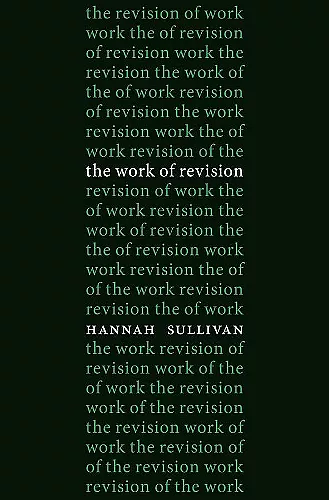The Work of Revision
Format:Hardback
Publisher:Harvard University Press
Published:1st Jul '13
Should be back in stock very soon

Revision might seem to be an intrinsic part of good writing. But Hannah Sullivan argues that we inherit our faith in the virtues of redrafting from early-twentieth-century modernism. Closely examining changes made in manuscripts, typescripts, and proofs by T. S. Eliot, Ezra Pound, Ernest Hemingway, James Joyce, Virginia Woolf, and others, she shows how modernist approaches to rewriting shaped literary style, and how the impulse to touch up, alter, and correct can sometimes go too far.
In the nineteenth century, revision was thought to mar a composition’s originality—a prejudice cultivated especially by the Romantics, who believed writing should be spontaneous and organic, and that rewriting indicated a failure of inspiration. Rejecting such views, avant-garde writers of the twentieth century devoted themselves to laborious acts of rewriting, both before and after publishing their work. The great pains undertaken in revision became a badge of honor for writers anxious to justify the value and difficulty of their work. In turn, many of the distinctive effects of modernist style—ellipsis, fragmentation, parataxis—were produced by zealous, experimental acts of excision and addition.
The early twentieth century also saw the advent of the typewriter. It proved the ideal tool for extensive, multi-stage revisions—superior even to the word processor in fostering self-scrutiny and rereading across multiple drafts. Tracing how master stylists from Henry James to Allen Ginsberg have approached their craft, The Work of Revision reveals how techniques developed in the service of avant-garde experiment have become compositional orthodoxy.
[Sullivan] reminds us of the laborious transformations that can occur before and after publication, and the mixed fortunes of those who revise and revise again… Provocative, timely and a welcome contribution to the study of Modernist writing, The Work of Revision goes to great lengths to show just how difficult it can be to elucidate the social life of texts whose use and meaning remain a work in progress. -- William Viney * Times Literary Supplement *
A truly remarkable new book… [A] subtle, nuanced argument. -- Alan Jacobs * Books & Culture *
An outstanding piece of scholarship, The Work of Revision valuably offers broad, comparative treatment, fascination with the complex process of revision, and rich, detailed analysis of manuscripts and versions. Sullivan has a knack for elucidating intricate matter, without ever losing the bigger picture or getting lost in overwhelming detail. -- Wim Van Mierlo * Time Present *
In Hannah Sullivan’s impressively researched first book, revisions become a ‘figure for modernism’—particularly for London-y High Moderns: from Henry James’ embroidered sentences to Ezra Pound’s minimalist poetics and surgery to The Waste Land; from Ulysses’ volcanic additions to Virginia Woolf’s traumatized self-portraits. Hardly is a mark unremarked-upon; even Pound’s colon from In a Station of the Metro is probed… Sullivan persuasively claims that Modern revising was radical, experimental, visible and self-conscious. -- David Gewanter * Times Higher Education *
Sullivan’s prose is clear and elegant. Even when immersed in the particulars of genetic history, The Work of Revision is highly engaging… Because of its impressive breadth and approachable style, this project will appeal to many. -- Emily James * Woolf Studies Annual *
Despite its sober title, there is nothing dry or dusty about Hannah Sullivan’s fascinating investigation of the work of revision in modernist writing. On the contrary her book often reads like a detective story, as the author brings her formidable learning and literary subtlety to bear on both the details of revision and their theoretical ramifications. Written with clarity and verve, this is a dazzling study that makes a powerful case for the necessity, but also for the pleasures, of genetic and textual criticism. -- Maud Ellmann, University of Chicago
Hannah Sullivan’s The Work of Revision offers a groundbreaking account of the theoretical typology of revision in literature and more specifically of the relation between revision and literary structure in modernist literature from Henry James to David Foster Wallace. Consolidating a great deal of recent textual, genetic, and critical study of modern literature, it brings back into the critical conversation priceless materials that too often have been allowed to play a supporting role in twentieth century commentaries. -- Ron Bush, University of Oxford
Sullivan has written a superb book, tracing the fortunes of literary revision from Henry James at the end of the nineteenth century to David Foster Wallace at the beginning of the twenty-first. Although it draws on genetic studies of individual writers, its focus is on the bigger story of shifts in the way literary works have been written, shaped by the changes both in technology and in conceptions of the literary project itself. Original, illuminating, and extremely readable, The Work of Revision is very timely, as we enter a new phase in the history of literary production; for the first time, we can look back, as Sullivan does, to the era of the typewriter as having an end as well as a beginning. -- Derek Attridge, University of York
Like the writers she analyzes, Sullivan ‘makes it new’ in this revisionist history of literary revision. We all know that the high modernists were incessant revisers of their work. What we didn’t know, until now, was the centrality of revision not only to the composition process but also to the diverse forms and content that emerge from it. The Work of Revision offers both a new critical language and a new history of print culture. We can’t see modernism in the same way again. -- Gavin Jones, Stanford University
- Nominated for MLA Prize for a First Book 2013
- Nominated for Modernist Studies Association Book Prize 2014
- Nominated for Barbara Perkins and George Perkins Prize 2015
ISBN: 9780674073128
Dimensions: unknown
Weight: unknown
360 pages